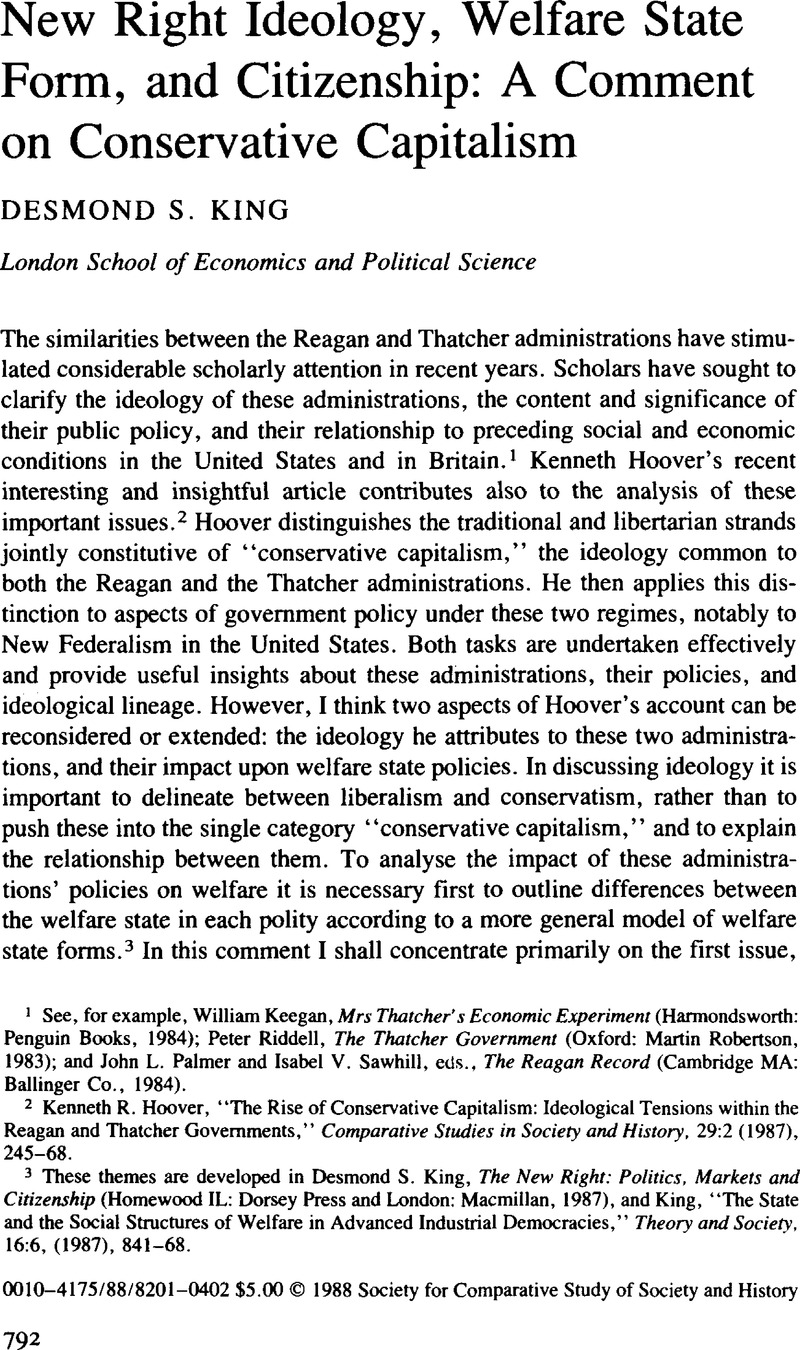Published online by Cambridge University Press: 03 June 2009

1 See, for example, Keegan, William, Mrs Thatcher's Economic Experiment (Harmondsworth: Penguin Books, 1984)Google Scholar; Riddell, Peter, The Thatcher Government (Oxford: Martin Robertson, 1983)Google Scholar; and Palmer, John L. and Sawhill, Isabel V., eds., The Reagan Record (Cambridge MA: Ballinger Co., 1984).Google Scholar
2 Hoover, Kenneth R., “The Rise of Conservative Capitalism: Ideological Tensions within the Reagan and Thatcher Governments,” Comparative Studies in Society and History, 29:2 (1987), 245–68.Google Scholar
3 These themes are developed in King, Desmond S., The New Right: Politics, Markets and Citizenship (Homewood IL: Dorsey Press and London: Macmillan, 1987)CrossRefGoogle Scholar, and King, “The State and the State Structures of Welfare in Advanced Industrial Democracies,” Theory and Society, 16:6, (1987), 841–68.Google Scholar
4 See Levitas, Ruth, ed., The Ideology of the New Right (Oxford: Polity, 1985)Google Scholar; Gamble, Andrew, “The Free Economy and the Strong State,” The Socialist Register, 5 (1979), 1–25Google Scholar; and Hall, Stuart and Jacques, Martin, eds., The Politics of Thatcherism (London: Lawrence and Wishart, 1983).Google Scholar
5 Hoover, “Rise of Conservative Capitalism,” 248.
6 Ibid.
7 See Ashford, Nigel, “The Bankruptcy of Collectivism,” in The “New Right” Enlightenment, Seldon, Arthur, ed. (London: Economic and Literary Books, 1985)Google Scholar; Bosaquet, Nick, After the New Right (London: Heinemann, 1983)CrossRefGoogle Scholar; and Hodgson, Geoff, The Democratic Economy (Harmondsworth: Penguin Books, 1984).Google Scholar
8 See Tullock, Gordon, The Vote Motive (London: Institute of Economic Affairs, 1976)Google Scholar; Buchanan, James et al., The Economics of Politics (London: Institute of Economic Affairs, 1978)Google Scholar; and Niskanen, William, Bureaucracy and Representative Government (Chicago IL: Aldine-Atherton, 1971).Google Scholar
9 See Nozick, Robert, Anarchy, State and Utopia (New York: Basic Books, 1974)Google Scholar; Rothbard, Murray, For a New Liberty: The Libertarian Manifesto (New York: Collier Books, 1978)Google Scholar; Rand, Ayn, Atlas Shrugged (New York: Random House, 1957)Google Scholar; and Newman, Stephen, Liberalism at Wits' End (Ithaca NY: Cornell University Press, 1984).Google Scholar
10 Nevertheless, there are important differences between liberals and libertarians. For example, according to libertarians, freedom is the supreme value and must take priority over order in all cases; such a strong view is unlikely to be held by many liberals.
11 For the concept of the social rights of citizenship, see Marshall, T. H., Class, Citizenship and Social Development (New York: Doubleday 1964)Google Scholar; King, New Right: Politics, Markets and Citizenship, ch. 9Google Scholar; and King, Desmond S. and Waldron, Jeremy, “Citizenship, Social Citizenship and the Defence of Welfare Provision,” British Journal of Political Science, 18:4 (1988), 489–517.CrossRefGoogle Scholar
12 Murray, Charles A., “The Two Wars against Poverty: Economic Growth and the Great Society,” The Public Interest, no. 69 (1982), 3–16Google Scholar. See also Gilder, George, Wealth and Poverty (New York: Basic Books, 1981) for a more radical statement.Google Scholar
13 See Peele, Gillian, Revival and Reaction: The Right in Contemporary America (Oxford: Clarendon Press, 1983), ch. 3.Google Scholar
14 See Edgar, David, “The Free or the Good,” in The Ideology of the New Right, Levitas, R., ed.Google Scholar
15 Hoover, “Rise of Conservative Capitalism,” 254–57.
16 See essays in Maurice Cowling, Conservative Essays (London: Cassell, 1978)Google ScholarPubMed; and Scruton, Roger, The Meaning of Conservatism (Harmondsworth: Penguin Books, 1980).Google Scholar
17 Hoover, “Rise of Conservative Capitalism,” 248.
18 Ibid., 251.
19 Nisbet, Robert, The Sociological Tradition (London: Heinemann, 1966), 11.Google Scholar
20 See Robinson, Ray, “Restructuring the Welfare State: An Analysis of Public Expenditure, 1979/80–1984/85,” Journal of Social Policy, 15:1CrossRefGoogle ScholarPubMed, 1–21; and Palmer, and Sawhill, , eds., Reagan Record.Google Scholar
21 Korpi, Walter, The Democratic Class Struggle (London: Routledge, Kegan and Paul, 1983).Google Scholar
22 See Bosanquet, Nick, “Interim Report: Public Spending and the Welfare State,” in British Social Attitudes: The 1986 Report, Jowell, Roger, Witherspoon, Sharon, and Lindsay Brook, eds. (Aldershot: Gower, 1986).Google Scholar